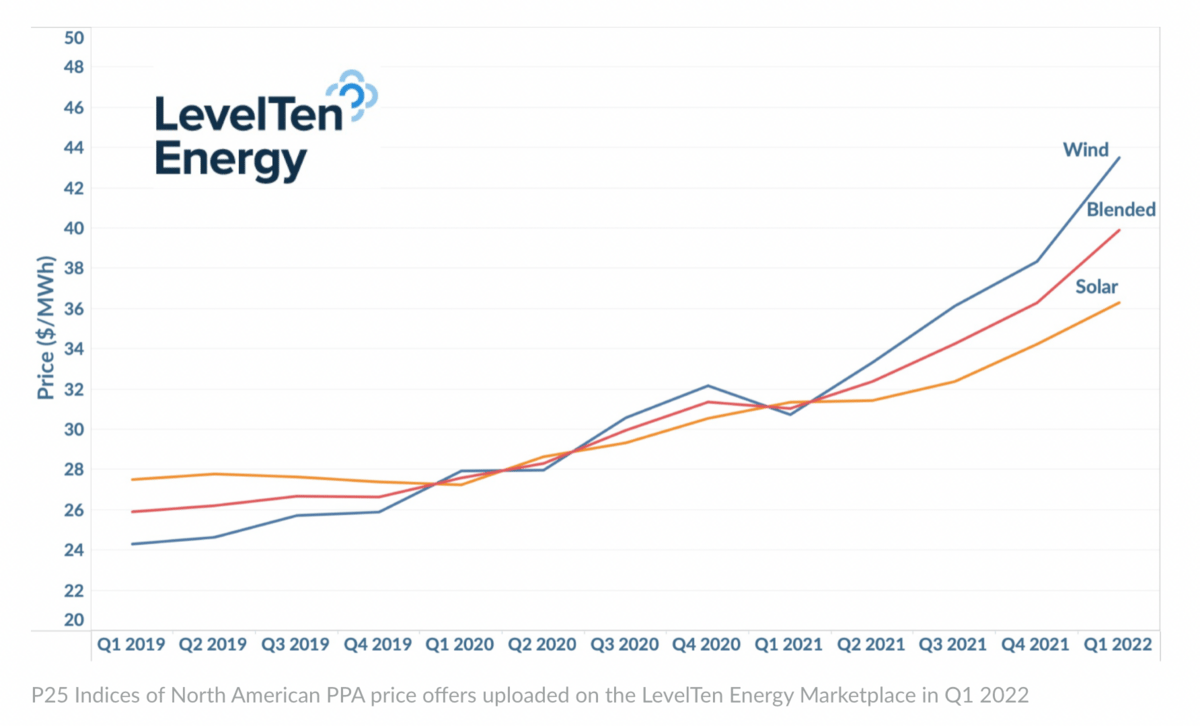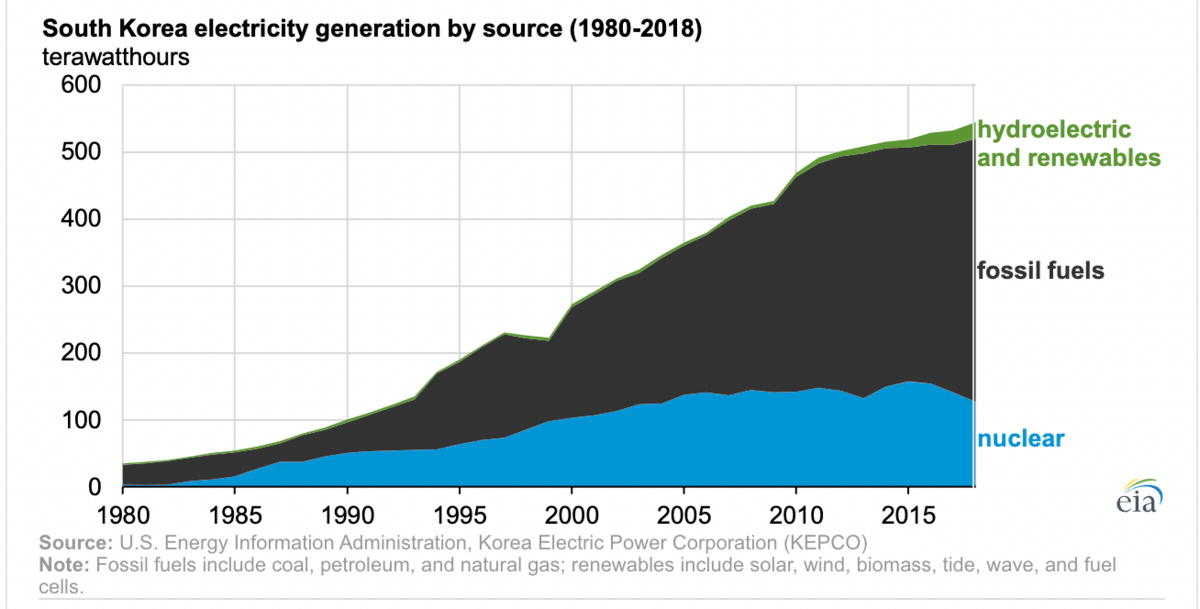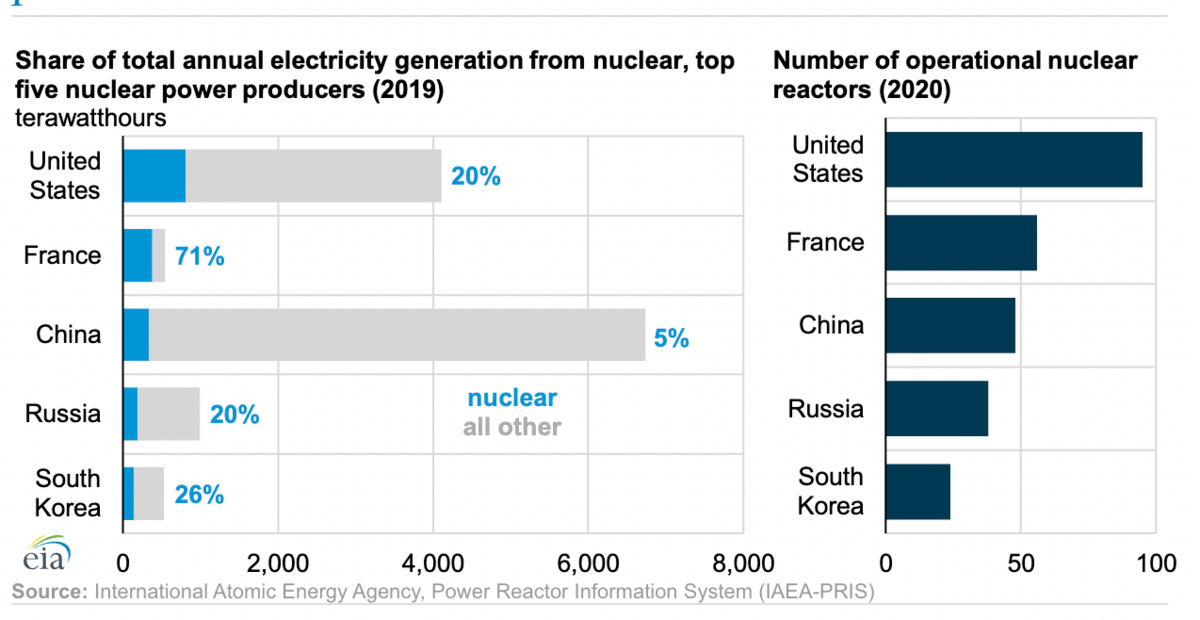North American Renewable Energy Prices Soar by 30%
A new report from LevelTen Energy, which operates the world's largest Power Purchase Agreement marketplace, posts some startling shifts in the renewables industry. According to the report, developers are struggling to meet demand due to a beleaguered Q1 development landscape with inflation and supply chain issues at the fore.
As a result, "This is leading to a shortage of power purchase agreements for corporations and other large energy buyers, which are critical to bringing new clean energy projects online and meeting corporate and federal net-zero targets."
The imbalance in PPA supply and demand has shot the price up 9.7% during the first quarter of 2022 to nearly $40 per MWh.

Here are some other important stats from the report:
Since last quarter, the Electric Reliability Council of Texas's P25 solar PPA prices rose by 13.3% to $32 per MWh. Wind prices stayed mostly flat at $26.70 per MWh.
PJM, which serves 13 northeastern states, has about 300 GW of renewables projects awaiting approval. The backlog has caused a PPA price spike. Since last quarter, PJM’s P25 wind PPA prices rose 15.6% to $55.10 per MWh. Solar prices rose 2% to $44 per MWh.
"The U.S. Department of Commerce’s recent announcement of potential new tariffs on solar cells imported from four southeast Asian countries, where 80% of solar cells are imported from, could set developers back on the supply chain improvements they’ve been able to make."
The wind industry has noticed these problems as well. Steel for offshore wind towers is currently going for $2,000 per tonne. For reference, a wind turbine can require about 335 tons of steel and nearly 5 tons of copper (which has also seen price spikes).
“The state of the supply chain is ultimately unhealthy right now,” said the chief executive of onshore wind at GE, Sheri Hickok at a recent industry event. “It is unhealthy because we have an inflationary market that is beyond what anybody anticipated even last year. Steel is going up three times. It is really ridiculous to think how we can sustain a supply chain in a growing industry with these kind of pressures.”
South Korea Halts Nuclear Phaseout
South Korea's new government has pledged to reverse the previous administration's nuclear phaseout strategy. Won Hee-ryong, policy chief on president-elect Yoon Suk-yeol’s transition committee, said that former President Moon's plan to shutter nuclear had increased emissions and electricity bills.
Moon's plan was to halt the construction of all new plants and retire older models, drawing the reactor count down to 17 by 2034.

Coal accounted for 42% and natural gas 25% of South Korea’s energy mix in 2019, whereas wind and solar accounted for only 4.7% of electricity generation in 2021, less than half the global average.
But in 2019, South Korea's nuclear reactors generated 139 terawatt-hours of electricity, making the country the world's fifth-largest nuclear power producer. Nuclear accounted for 26% of the country’s total electricity generation.

It seems that the Ukraine war has partially inspired the president-elect's policy. The Financial Times reports, "Kim Yong-soo, professor of nuclear engineering at Hanyang University in Seoul, said that the war in Ukraine had exposed Moon’s nuclear policy as unviable. 'Energy security and soaring energy prices have come to the fore since the Ukraine crisis,' said Kim."
South Korea imports nearly 20% of its coal from Russia. According to FT, an official at Korea Western Power has "not made any additional purchases of Russian coal since Russia’s invasion of Ukraine."
Manchin and Risch Introduce International Nuclear Energy Act
Some American politicians have noticed that Russia and China are running circles around the US when it comes to international nuclear builds. Senators Manchin (D-WV) and Risch (R-ID) have introduced legislation to change that.
Coordinate civil nuclear exports strategy
Establish financing relationships
Promote regulatory harmonization
Enhance safeguards and security
Promote standardization of licensing framework
Create an exports working group
It would also establish a Strategic Infrastructure Fund Working Group (SIFW) to determine how to best structure a fund to finance projects critical to national security.
Create fast-track procedures for deemed civil nuclear exports for countries defined by the Secretary of Energy
Expand the Export-Import Bank program on Transformational Exports to include civil nuclear facilities and related goods
create the US Nuclear Fuels Security Initiative to reduce reliance on Chinese and Russian nuclear fuels
The act would also require two biennial summits. One would focus on nuclear safety, security, and safeguards. The other would be for civil nuclear vendors to enhance relationships between private industry and government.
"Russia’s brutal invasion of Ukraine has only highlighted the importance of energy security. This bill takes significant steps to re-establish American leadership in nuclear energy, both at home and abroad, which is critical to ensuring the security of energy supplies for ourselves and our allies, global standards for nonproliferation, and other national security interests, and economic growth," Risch said.
And Manchin said, "Our bipartisan bill establishes an Office for Nuclear Energy Policy to engage with our allies and industry partners to offset Chinese and Russian influence and reduce our reliance on nuclear fuels from these and other adversarial nations."
This could be a huge step forward for American nuclear.
Conversation Starters
India faces another coal crunch. 2/3 of India's electricity comes from coal. Last fall the country was always encountering low coal reserves. Now, rising electricity demand and supply problems are putting the squeeze on the country's grid. Blackouts are not out of the question.
Turkey is considering a regional gas hub and more nuclear energy to curb its reliance on Russian imports. Right now, Turkey imports about a third of its energy from Russia. Rosatom, Russia's nuclear company, is building the country's first nuclear reactor set to switch on next year. Turkey plans to build twelve more large reactors at three different sites.
Amazon rolled out a surcharge for rising fuel costs this week. Sellers will now pay 5% more in delivery costs, which Amazon says will neither be permanent nor passed on to customers. The company delivered an estimated 3.25 billion packages through its fulfillment arm in 2021.
Word of the Day
Gamma rays
n.
High energy electromagnetic radiation from the atomic nucleus, virtually identical to X-rays.
Crom's Blessing
Image from General Electric's 1957 Annual Report
